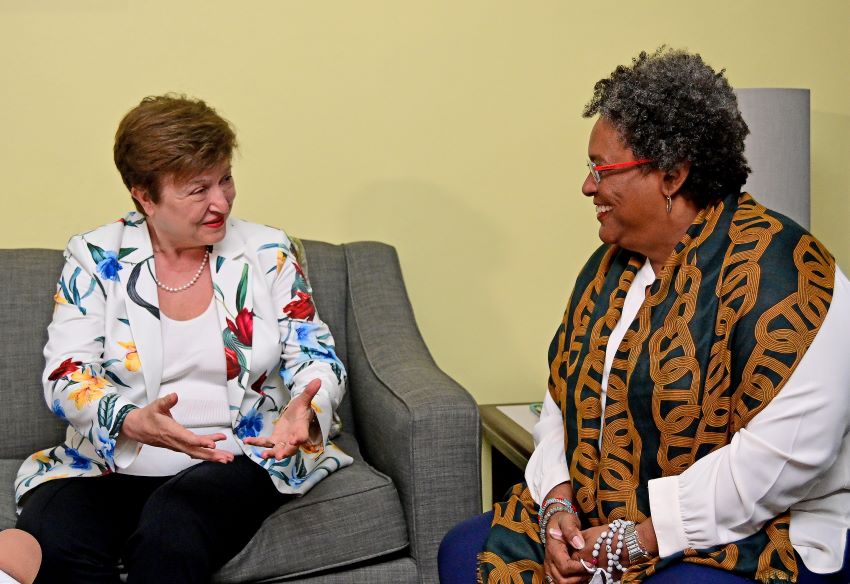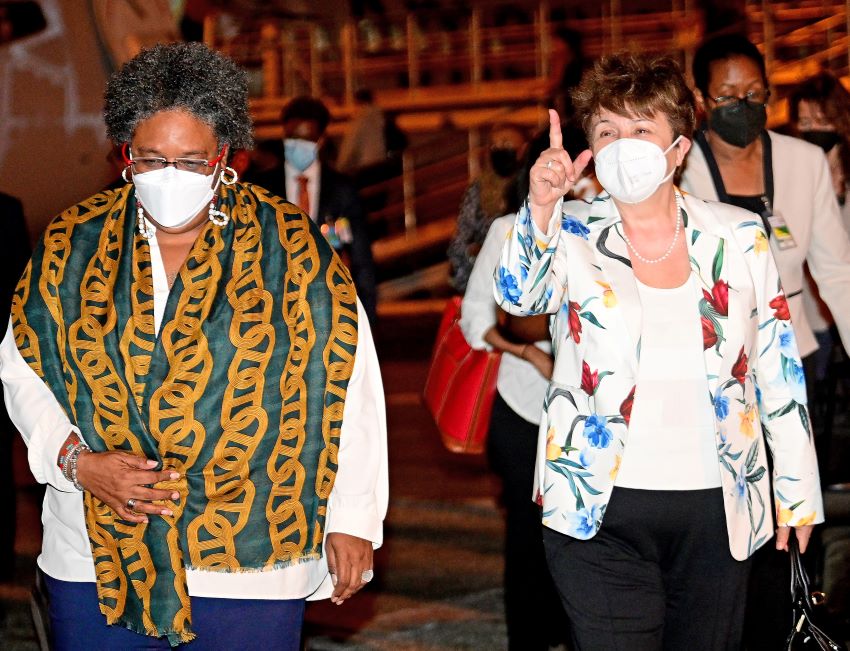
Caribbean governments now have a financial instrument to assist them on the basis of their vulnerabilities and not on income levels, to address issues of climate change.
The new instrument comes following years of protestations from regional leaders, and in recent times from Prime Minister Mia Amor Mottley, who spoke out repeatedly in the international arena about the inequitable access to finance for small island states.
Managing Director of the International Monetary Fund (IMF), Kristalina Georgieva, credited Ms. Mottley for her efforts on Tuesday night after touching down at the Grantley Adams International Airport on a four-day visit.
“We want to build content experience for the future and expand it in the area of climate action. We now have a new instrument that Prime Minister Motley has a personal contribution to putting in place; it is called Resilience and Sustainability Trust. It is the first time the IMF offers our members, long term maturity, a long term grace period so that money can be invested in transforming economies to be stronger for the future,” Ms. Georgieva underlined.
She continued: “What is the news for the people in Barbados? Prime Minister mostly for years has been arguing that the IMF and other financial institutions should provide concessional financing on the basis of vulnerability of countries, not just income levels. And now what you have been advocating for Prime Minister is finally a reality. I look very much forward to our engagement and I look forward to meeting with people here, especially the young people.”
The IMF top official commended the resilience of the Caribbean region for withstanding the triple crises facing the world – the war in Ukraine, and soaring food and energy prices.
Ms. Georgieva said she wants to learn from the experiences of the region, and praised Prime Minister Mottley for championing the cause of climate change and taking action now to prevent future suffering.
The IMF Managing Director articulated the view that the region needed to shore up its resilience to withstand present and future shocks while pointing to the impact of the war and the resultant high food and energy prices and the impact of the COVID-19 pandemic on tourism dependent countries.
She added: “The most important contribution we at the IMF can make is to help countries build resilience to these future shocks, and it is so important here, and it is so impressive, the resilience of the people of the Caribbean…. It is amazing and I want to learn more from you, so that we can pass it to others.”

Ms. Georgieva gave the assurance that the IMF is a “steadfast partner of the Caribbean”, having worked with the islands for several years to build economic resilience, and those efforts, according to her, had “paid off when the pandemic hit”.
She thanked Ms. Mottley for the invitation to Barbados, while pointing out that she was the first Managing Director of the Fund to visit “this part” of the Caribbean and to engage in talks with the Prime Minister, her team and other policy makers from the Caribbean expected in the island towards the end of the week”.
In turn, the Prime Minister mentioned the strides made under Ms. Georgieva’s leadership, as it relates to recognising that “countries don’t only need access to funding on the basis of national income”, but on the basis of whether they are “climate vulnerable”.
Ms. Mottley continued: “And the response with the establishment of the Resilience and Sustainability Trust is evidence that the IMF not only has recognised the problem, but it cares enough to put an instrument in place to meet the needs of these countries that are on the frontline of the climate crisis.”
She further stated: “You have confirmed, as I’ve said to the people of Barbados and the Caribbean, that we’re facing triple crises. We face the climate crisis, the pandemic crisis, and of course now the crisis coming from the war in Ukraine that has compounded already a supply chain problem that existed before with the pandemic, but has been made absolutely worse by reason of the war. And therefore, Barbadians have been facing and reeling from the increase in fuel and the increase in food prices, like persons elsewhere in the world.”
Ms. Mottley insisted that we must come together to see how best governments can continue to shield its people, while at the same time reinforcing the economic fundamentals that would lead to growth that would take us out of this situation.
